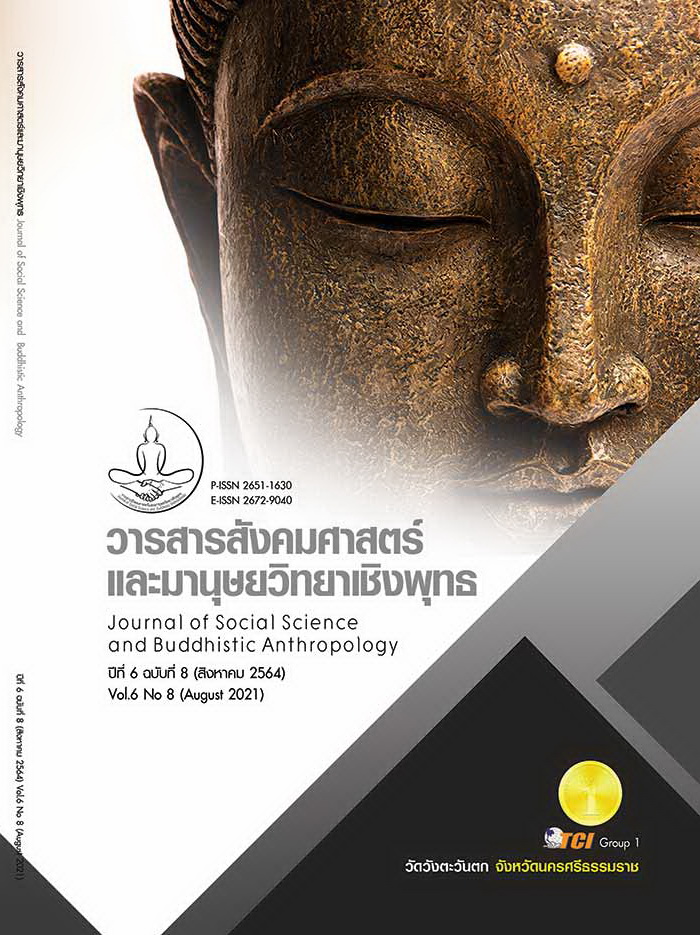MODEL FOR ENHANCING EVALUATION CULTURE BASED ON PROFESSIONAL LEARNING COMMUNITY FOR PRIMARY SCHOOL TEACHERS
Keywords:
Mode, Evaluation Culture, Professional Learning Community, Primary School TeachersAbstract
The objectives of this research article were to 1) examine the components and indicators of evaluation culture for primary teachers, 2) develop a model for enhancing evaluation culture based on professional learning community approach and 3) study the effects after the model implementation. To study of the developed model by research and development. The sample consisted of 20 teachers in 2 schools under Sakon Nakhon Primary Educational Service Area Office 3 in the academic year 2020, Selected by simple random sampling, were divided into an experimental group and a control group with 10 teachers in each group. The instruments were test, performance assessment form, questionnaire, and self - assessment form. The statistics used to analyze the data were percentage, mean, standard deviation, and t - test. The results of the research were as: 1) The evaluation culture included 4 components with 60 indicators: 1.1) knowledge and understanding, 1.2) practical skills, 1.3) belief and values toward evaluation implementation, and 1.4) applying the evaluations continuously. 2) The model consisted of background and importance, objectives, basic concepts, principles, scope of development, guidelines for developing culture, and measurement and evaluation. The guidelines for developing culture involved: 2.1) building a support structure of community professional learning, 2.2) collaborative learning, 2.3) joint action for learner development, and 2.4) providing friendly feedback. The result of the model suitability evaluation was at the highest level. 3) The effects showed that an experimental group gained knowledge and understanding with 77 percent and practical skills with 87 percent. The belief and values were at the highest level. The continuous implementation was at the highest level. All components were higher than the set criteria and significantly higher than the control group at the .05 level, and the experimental group had evaluation culture the following components of knowledge and understanding, beliefs and values, and applying continuously higher than before using the model with statistical significance at the .05 level.
References
ทิศนา แขมมณี. (2558). ศาสตร์การสอน: องค์ความรู้เพื่อจัดกระบวนการเรียนรู้ที่มีประสิทธิภาพ. กรุงเทพมหานคร: สำนักพิมพ์แห่งจุฬาลงกรณ์มหาวิทยาลัย.
ปิยพร ชุมจันทร์. (2558). รูปแบบการพัฒนาครูด้านการประเมินการเรียนรู้สำหรับสถานศึกษาขั้นพื้นฐาน. ใน ดุษฎีนิพนธ์ศึกษาศาสตรดุษฎีบัณฑิต สาขาวิชาวิจัยและประเมินทางการศึกษา. มหาวิทยาลัยเกษตรศาสตร์.
พวงรัตน์ ทวีรัตน์. (2540). วิธีการวิจัยทางพฤติกรรมศาสตร์และสังคมศาสตร์. (พิมพ์ครั้งที่ 7). กรุงเทพมหานคร: สำนักทดสอบทางการศึกษาและจิตวิทยา มหาวิทยาลัยศรีนครินทรวิโรฒ ประสานมิตร.
วิจารณ์ พานิช. (2555). วิถีสร้างการเรียนรู้เพื่อศิษย์ในศตวรรษที่ 21 มูลนิธิสดศรี - สฤษดิ์วงศ์. กรุงเทพมหานคร: เอสอาร์พริ้นติ้ง.
วิษณุ ทรัพย์สมบัติ. (2549). การพัฒนาวัฒนธรรมการประเมินการเรียนการสอนของครู: การฝึกอบรมโดยใช้โรงเรียนเป็นฐานด้วยการสร้างเครือข่ายและการคิดสะท้อนอภิมาน. ใน ดุษฎีนิพนธ์ครุศาสตรดุษฎีบัณฑิต สาขาวิชาวิธีวิทยาการวิจัยการศึกษา. จุฬาลงกรณ์มหาวิทยาลัย.
ศูนย์พัฒนาวิชาการเพื่อการเรียนรู้ มหาวิทยาลัยมหาสารคาม. (2556). บันทึกกระบวนการ CADL MSU I: กระบวนทัศน์ กระบวนการ และประสบการณ์การขับเคลื่อนทักษะอนาคตในบริบทไทย. มหาสารคาม: สำนักพิมพ์แห่งมหาวิทยาลัยมหาสารคาม.
สํานักงานเลขาธิการสภาการศึกษา. (2558). สมรรถนะการศึกษาไทยในเวทีสากล พ.ศ. 2558 (IMD 2015). กรุงเทพมหานคร: พริกหวานกราฟฟิค.
สำนักงานคณะกรรมการการศึกษาขั้นพื้นฐาน. (2553). การกำหนดมาตรฐานการศึกษาของสถานศึกษา. เรียกใช้เมื่อ 2 พฤษภาคม 2562 จาก http://www.sesa20.go.th
สำนักงานคณะกรรมการการศึกษาขั้นพื้นฐาน. (2556). แนวทางการเสริมสร้างวัฒนธรรมองค์กร. เรียกใช้เมื่อ 16 ธันวาคม 2562 จาก http://skm.sskedarea.net/plan /obce.
สำนักพัฒนาครูและบุคลากรการศึกษาขั้นพื้นฐาน. (2560). คู่มือประกอบการอบรมคณะกรรมการขับเคลื่อนกระบวนการ PLC (Professional Learning Community) “ชุมชนการเรียนรู้ทางวิชาชีพ” สู่สถานศึกษา . กรุงเทพมหานคร: โรงพิมพ์คุรุสภา กระทรวงศึกษาธิการ.
สำนักวิชาการและมาตรฐานการศีกษา. (2554). แนวปฏิบัติการวัดและประเมินผลการเรียนรู้ตามหลักสูตรแกนกลางการศึกษาขั้นพื้นฐาน พุทธศักราช 2551. กรุงเทพมหานคร: โรงพิมพ์ชุมนุมสหกรณ์การเกษตรแห่งประเทศไทย.
สำราญ กำจัดภัย. (2560). รูปแบบการพัฒนาสมรรถนะนักศึกษาครูในการเตรียมฝึกปฏิบัติการสอน โดยใช้การเสริมสร้างพลังและการจัดการเรียนรู้เชิงรุก. ใน รายงานการวิจัย. มหาวิทยาลัยราชภัฏสกลนคร.
สุวิมล ว่องวานิช และคณะ. (2556). การวัดและประเมินผลการเรียนรู้แนวใหม่. กรุงเทพมหานคร: สำนักพิมพ์แห่งจุฬาลงกรณ์มหาวิทยาลัย.
อรรถกร ชัยมูล. (2561). การพัฒนาหลักสูตรฝึกอบรมเพื่อเสริมสร้างวัฒนธรรมการวิจัยในการจัดการเรียนรู้สําหรับครูโรงเรียนประถมศึกษา สังกัดสํานักงานเขตพื้นที่การศึกษาประถมศึกษาบึงกาฬ. ใน ดุษฎีนิพนธ์ปรัชญาดุษฎีบัญฑิต สาขาวิชาวิจัยหลักสูตรและการสอน. มหาวิทยาลัยราชภัฏสกลนคร.
Binkley. M. (2013). Draft White Paper 1: Defining 21st Century Skills. Assessment and Teaching of 21st Century Skills (ATCS). Retrieved July 12, 2018, from http://atc21s.org /wpcontent/uploads/2011/11/1-Defining-21st-Century-Skills.pdf
Carpenter, D. (2012). Professional Learning Communities’ Impact on Science Teacher Classroom Practice in a Midwestern Urban School District. Dissertations. Lincoln, USA: University of Nebraska - Lincoln.
Ferguson, L. (2003). Developing an evaluative culture. Retrieved March 2, 2018, from http://www/evaluation/canada/distribution220030917 _ferguson_linda.pdf
Phillip, J. B. (2009). The five dimensions of professional learning communities In Improving exemplary Texas elementary schools. In DissertationPrepared for the Degree of Doctor of Education. University of north Texas.
Sanders, J. R. (2002). A vision for Evaluation. American Journal of Evaluation, 22(5), 363-366.
The United States General Accounting Office: GAO. (2003). An evaluation culture and collaborative partnerships help build agency capacity. Retrieved May 1, 2018, from http://www.gao.gov/cgi-bin/getrpt? GAO-03-454
Trochim, W. M. K. (2002). An evaluative culture. Retrieved May 1, 2018, from http://www.socialresearchmethods.Net/kb/evalcult.htm
Trompenaars, F. & Hampden-Turner, C. (2006). Riaing the wave of culture. Understanding cultural diversity in business. London: Nicholas Berate.









